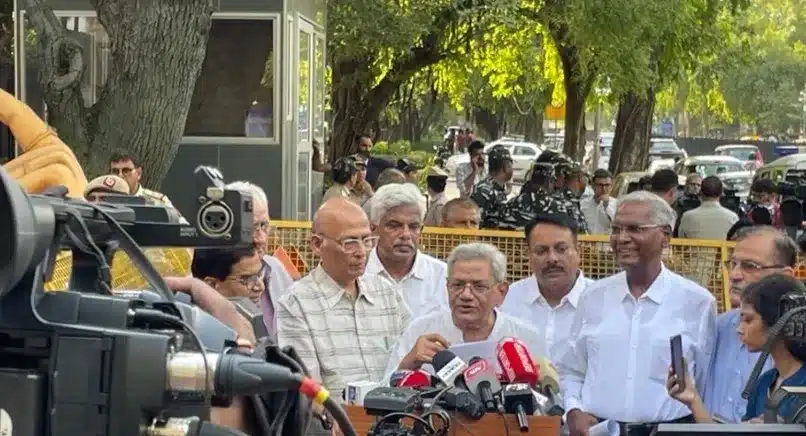What’s in today’s article?
- Why in News?
- What is Postal Voting?
- Background: counting the postal ballot
- What are the concerns raised by the Opposition parties on the new guidelines?
Why in News?
Ahead of the vote counting for the Lok Sabha elections on June 4, the INDIA bloc requested the Election Commission to instruct Returning Officers to finish counting postal ballots before starting the EVM vote count.
What is Postal Voting?
- About
- Postal voting, also known as absentee voting, is a method of voting in which electors cast their ballots by mail rather than in person at a polling station.
- This method is particularly useful for individuals who are unable to vote in person due to various reasons.
- E.g., being away from their home constituency, having a disability, or being engaged in essential services on election day.
- Eligibility
- Service voters:
- Members of the armed forces, paramilitary forces, and other government employees deployed on election duty far from their home constituencies.
- Absentee voters:
- Individuals who are unable to vote in person due to reasons such as being away from their home constituency for work, illness, or disability.
- Electors on election duty:
- Government officials and polling staff who are assigned duties at polling stations other than their own.
- Electors under preventive detention:
- Individuals who are detained under preventive custody orders during the election period.
- Eligibility during Covid pandemic
- During the Covid-19 pandemic, the facility was extended to those infected or suspected to be infected with the coronavirus, starting with the Bihar Assembly elections in 2020.
- Before the Bihar elections, the EC had recommended extending the postal ballot facility to those above 65 years of age and the Law Ministry had notified the amendment in June 2020.
- However, the ECI eventually decided not to extend the facility to those above 65 years.
- This was because the number of polling parties that would be required to cover the expanded age group would have been impractical.
- Service voters:
- Finally, in August 2023, the Law Ministry again amended the rule to take the eligibility back to 80 years from 65 years.
- Later in March 2024, the govt decided to raise the minimum age for senior citizens, eligible for voting by postal ballot, to 85 years from 80 years.
Background: counting the postal ballot
- Existing procedure till the 2019 LS elections
- Till the 2019 LS elections, the counting of postal ballots was taken up first and EVM counting began 30 minutes after that.
- And all postal ballots had to be counted before the EVM counting could be completed.
- Guidelines tweaked after 2019 LS election
- After the 2019 elections, the EC decided to tweak the guidelines as the number of postal ballots had gone up.
- The number of postal increased after:
- the introduction of the Electronically Transmitted Postal Ballot System (ETPBS), and
- the mandatory counting of VVPAT slips of five randomly selected polling stations per Assembly constituency or Assembly segment.
- The Election Commission changed its earlier rule that the second-to-last round of EVM counting should only begin after postal ballots are fully counted.
- Now, EVM counting can proceed regardless of the postal ballot count stage.
- As per the new guidelines, after 30 minutes of commencement of postal ballot counting, the EVM counting can start and continue irrespective of the stage of postal ballot counting.
- Once EVM counting is done, VVPAT slips can be counted.
- Additionally, the rule for mandatory re-counting of postal ballots was revised.
- Previously, a recount occurred if the victory margin was less than the total postal ballots.
- Now, only invalid postal ballots will be re-verified if the margin is less than the number of such rejected ballots.
- Postal ballot – statistics
- A total of 22.71 lakh postal ballots were received during the 2019 Lok Sabha elections or 0.37% of the total 60.76 crore valid votes.
- The number of postal ballots is expected to be higher this time.
What are the concerns raised by the Opposition parties on the new guidelines?
- Highlighted Rule 54A of the Conduct of Elections Rules, 1961
- Section 54A of the 1961 Rules says returning officers shall first deal with the postal ballot papers.
- The opposition parties said the EC’s 2019 directive undermines the purpose for enacting section 54A of the 1961 Rules.
- They also claimed that the EC cannot nullify the rules through executive directions by issuing letters.
- Cited 2020 Bihar elections as an example
- 2020 Bihar election was the first election (which was conducted after the onset of the Covid-19 pandemic) where the postal ballots were counted at the end of the counting of EVM votes.
- They reminded the Election Commission that in the 2020 Bihar elections, the winning margin was 12,700 votes while there were 52,000 postal ballots.
- There was an outcry after the Bihar election in 2020 because the postal ballots were counted at the end of the EVM vote counting.
- This sequence raised concerns among the public and opposition parties due to the potential impact on the perceived transparency and fairness of the election results.
- The opposition argued that counting postal ballots at the end could influence the final outcome, especially in cases where the winning margins are narrow.
Q.1. What is an Electronic voting machine (EVM)?
An Electronic Voting Machine (EVM) is a device used for conducting electronic voting in elections. It is a specialized electronic device designed to record votes accurately and securely. EVMs are used to replace traditional paper ballot systems in many countries around the world.
Q.2. What is Voter verifiable paper audit trail (VVPAT)?
Voter verifiable paper audit trail (VVPAT) or verifiable paper record (VPR) is a method of providing feedback to voters using a ballotless voting system. A VVPAT is intended as an independent verification system for voting machines designed to allow voters to verify that their vote was cast correctly, to detect possible election fraud or malfunction, and to provide a means to audit the stored electronic results.
Source: Behind Opposition postal ballot concern, Election Commission rule change in 2019 | The Wire | Times of India | India Today
Last updated on December, 2025
→ Check out the latest UPSC Syllabus 2026 here.
→ Join Vajiram & Ravi’s Interview Guidance Programme for expert help to crack your final UPSC stage.
→ UPSC Mains Result 2025 is now out.
→ UPSC Notification 2026 is scheduled to be released on January 14, 2026.
→ UPSC Calendar 2026 is released on 15th May, 2025.
→ The UPSC Vacancy 2025 were released 1129, out of which 979 were for UPSC CSE and remaining 150 are for UPSC IFoS.
→ UPSC Prelims 2026 will be conducted on 24th May, 2026 & UPSC Mains 2026 will be conducted on 21st August 2026.
→ The UPSC Selection Process is of 3 stages-Prelims, Mains and Interview.
→ UPSC Result 2024 is released with latest UPSC Marksheet 2024. Check Now!
→ UPSC Prelims Result 2025 is out now for the CSE held on 25 May 2025.
→ UPSC Toppers List 2024 is released now. Shakti Dubey is UPSC AIR 1 2024 Topper.
→ UPSC Prelims Question Paper 2025 and Unofficial Prelims Answer Key 2025 are available now.
→ UPSC Mains Question Paper 2025 is out for Essay, GS 1, 2, 3 & GS 4.
→ UPSC Mains Indian Language Question Paper 2025 is now out.
→ UPSC Mains Optional Question Paper 2025 is now out.
→ Also check Best IAS Coaching in Delhi

















